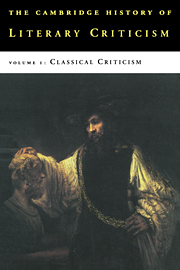Book contents
- Frontmatter
- 1 Early Greek views of poets and poetry
- 2 Language and meaning in archaic and classical Greece
- 3 Plato and poetry
- 4 Aristotle's poetics
- 5 The evolution of a theory of artistic prose
- 6 Hellenistic literary and philosophical scholarship
- 7 The growth of literature and criticism at Rome
- 8 Augustan Critics
- 9 Latin Criticism of the Early Empire
- 10 Greek Criticism of the Empire
- 11 Christianity and Criticism
- Bibliography
- Index
- References
7 - The growth of literature and criticism at Rome
Published online by Cambridge University Press: 28 March 2008
- Frontmatter
- 1 Early Greek views of poets and poetry
- 2 Language and meaning in archaic and classical Greece
- 3 Plato and poetry
- 4 Aristotle's poetics
- 5 The evolution of a theory of artistic prose
- 6 Hellenistic literary and philosophical scholarship
- 7 The growth of literature and criticism at Rome
- 8 Augustan Critics
- 9 Latin Criticism of the Early Empire
- 10 Greek Criticism of the Empire
- 11 Christianity and Criticism
- Bibliography
- Index
- References
Summary
If the Greeks were first in Europe to create and record literature, to develop literary genres and define their natures, and to evolve critical systems for describing and prescribing forms of rhetoric and poetry, the Romans, paradoxically, scored a different first. They were the first cultural community to inherit literary models - those set up for them by the Greeks - before they began to compose their own literature. It might be claimed that they practised literary criticism, however rudimentary, before they practised literature, for they were faced with questions of what to imitate and how. The emergence of a relatively developed, highly imitative, national literature in the third century BC has some analogies to the appearance of new criticism and national literatures in the Renaissance; in both cases critical theory, adapted from the prototype literature, helped to mould form and content and in both cases formal education in grammar and rhetoric provided norms for literary expression. But Renaissance writers in the vernacular had a richer tradition of native poetry on which to draw than did the Romans, richer lexical resources, and greater ambition for literary originality.
Livius Andronicus, Naevius, and Ennius
Of Rome's three earliest poets, two were professional teachers and both were culturally as much Greek as Italian. The few relatively secure facts about Livius Andronicus are representative of Rome's literary beginnings. He came from Tarentum in Greek-speaking south Italy, which had been captured by Roman forces between 280 and 275 BC. He probably knew little Latin when he first came to Rome, but from time spent in instructing young Romans in Greek acquired sufficient command of Latin to produce a translation of the Odyssey, not into quantitive Greek hexameters, but into archaic, accentual Saturnian verse.
- Type
- Chapter
- Information
- The Cambridge History of Literary Criticism , pp. 220 - 244Publisher: Cambridge University PressPrint publication year: 1990
References
- 1
- Cited by



